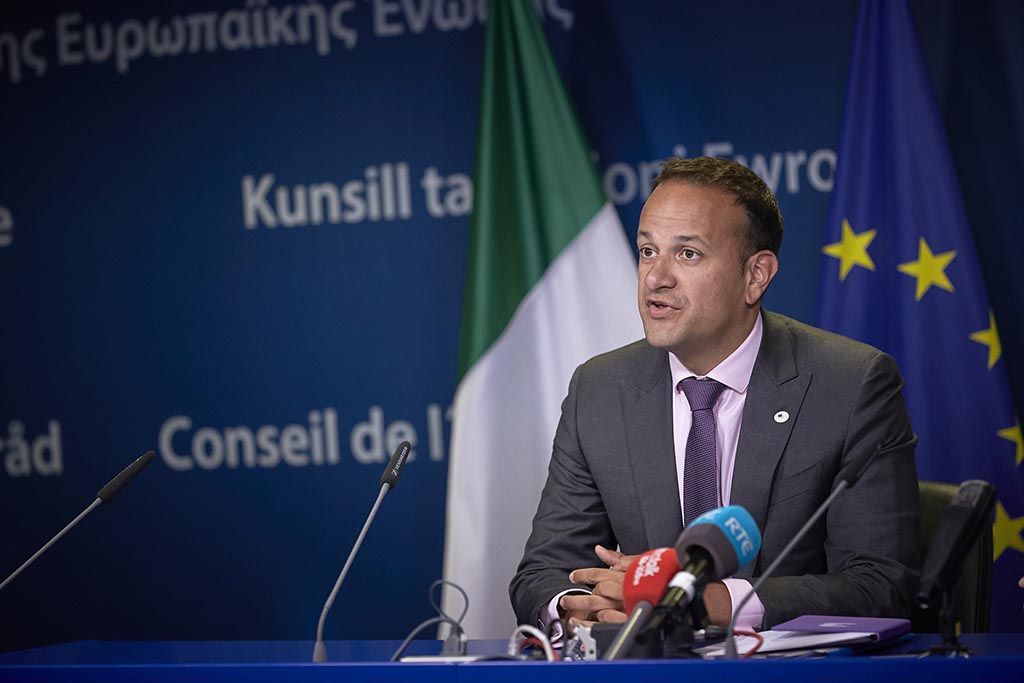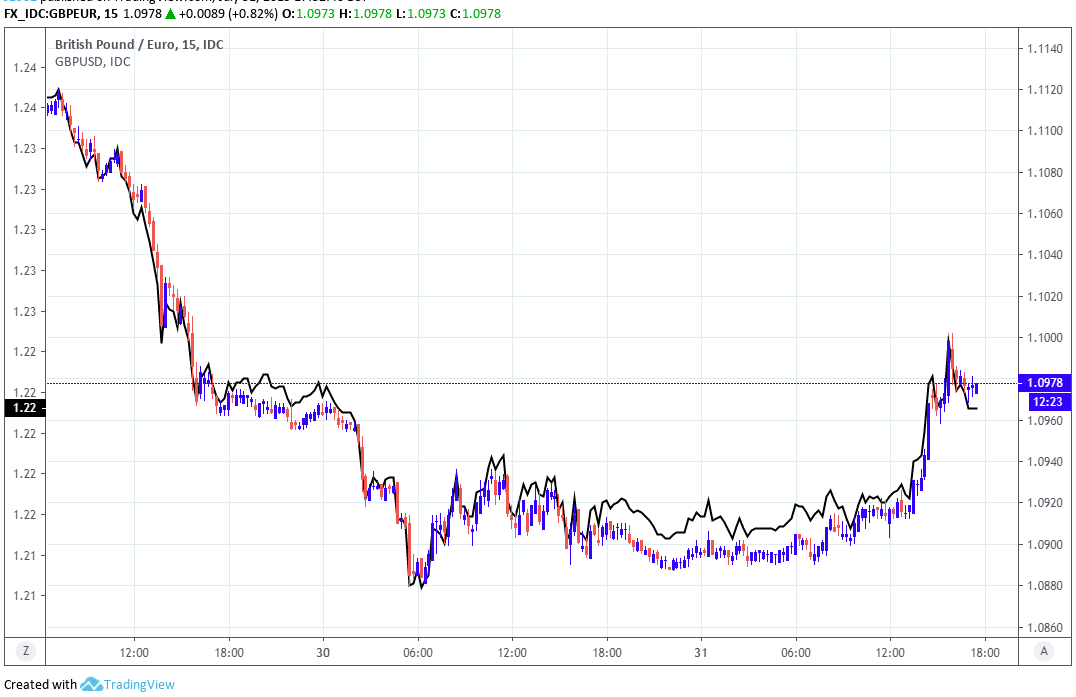British Pound Bests a Struggling Euro on Signs of DUP Olive Branch

Above: Irish Taoiseach Leo Varadkar. File Image © European Council, Reproduced Under CC Licensing
- Sterling higher on Wednesday after DUP hints at compromise.
- Time limits to backstop discussed in meeting with Boris Johnson.
- But DUP says Ireland must show "willingness" to engage with Johnson.
- Johnson / Varadkar call highlights gulf between two sides on Brexit.
The Pound advanced against a struggling Euro and resilient Dollar Wednesday amid speculation the Democratic Unionist Party (DUP) could compromise on its demands over the so-called Northern Irish backstop so long as the Republic of Ireland shows "willingness" the break the Brexit deadlock.
DUP leader Arlene Foster, speaking after morning meetings with Prime Minister Boris Johnson, told reporters "there are things that can be done" to break the Brexit deadlock but that Dublin will need to "dial down its rhetoric" and be willing to engage if a solution is to be found before an October 31 deadline.
"No-deal is on the table because of the fact that we have a very belligerent European Union..."
— BBC Breakfast (@BBCBreakfast) July 31, 2019
Arlene Foster the @DUPleader tells #BBCBreakfast what she discussed with @BorisJohnson last night ⬇️ pic.twitter.com/GPnY1auu8H
Foster's comments were followed by remarks from DUP MP Jeffrey Donaldson, who is said to have acknowledged that the subject of a possible time limit to the 'Northern Irish backstop in the EU Withdrawal Agreement was discussed during the meeting with Boris Johnson.
The remarks come amid signs that the unity among politicians in the Republic of Ireland, which has doubtless aided Irish leader Leo Varadkar's handling of the Brexit process, beginning to crack. Opposition MPs as well as government confidence and supply partners have criticised Varadkar in recent days.
Sterling was quoted 0.42% higher at 1.2208 against a resilient Dollar by the London close, after hitting a two-year low in prior session amid speculation that a 'no deal' Brexit at the end of October was growing increasingly likely.
Adverse economic growth and inflation figures released in the morning hours sent the Euro tumbling against all major currencies, which contributed to a 0.72% gain that took the Pound-to-Euro rate up to 1.0977.

Above: Pound-to-Euro rate at 15-minute intervals, alongside Pound-to-Dollar rate (black line, left axis).
"Brexit has a long way to run before it reaches a conclusion. So, in our view, in the near term sterling is oversold and in our FX strategy we overweight the British pound versus the US dollar," says Mark Haefele, chief investment officer at UBS Global Wealth Management.
A phone call between UK Prime Minister and Ireland's Taoiseach Leo Varadkar cast light over the chasm that has opened up between the two respective sides of the English Channel and the Irish Sea.
Foreign exchange markets have increasingly feared the gap will not be bridged before the October 31 Brexit deadline.
"The prime minister made clear that the UK will be leaving the EU on October 31, no matter what," a Downing Street official said in a statement regarding the phone call. "The prime minister made clear that the government will approach any negotiations which take place with determination and energy and in a spirit of friendship, and that his clear preference is to leave the EU with a deal, but it must be one that abolishes the backstop."
Above: Pound-to-Euro rate at daily intervals, alongside Pound-to-Dollar rate (black line, left axis).
Johnson told Varadkar the Irish border backstop would have to be removed from the existing Brexit deal if there was to be a deal at all. He also reiterated previous government commitments not to impose physical barriers on the Northern Irish border for the sake of managing the flow of goods.
"The Taoiseach explained that the EU was united in its view that the Withdrawal Agreement could not be reopened," the Irish government said. "Alternative arrangements could replace the backstop in the future... but thus far satisfactory options have yet to be identified and demonstrated."
The decline in Sterling since May is symptomatic of the market pricing in the prospect of a 'no deal' Brexit, although what matters going forward is how much more pricing must be done. Wednesday's statements have lifted the Pound but the gap between the two sides of the English Channel remains substantial.
"My strongest view remains that GBP has further to fall in order to catch up with recent political developments. The consensus view, I believe, has always been that ultimately a soft Brexit deal would be negotiated or better still a 2nd referendum would avert. The odds on this have shifted markedly in the past days and weeks and despite recent weakness I suspect the GBP needs to fall further," says Jonathan Pierce, on the sales and trading desk at Credit Suisse.
Above: Pound-to-Euro rate at daily intervals, alongside Pound-to-Dollar rate (black line, left axis).
Samuel Tombs, chief UK economist at Pantheon Macroeconomics and a top rated forecaster with Reuters and Bloomberg, says money market pricing suggests there's a 40% probability that a 'no deal' will be the outcome.
"Markets now seem to think there's a 40% chance of a no-deal Brexit, up from just 20% a month ago," says Tombs. "That's the steer from the OIS market, which is pricing-in only a 5% chance of Bank Rate being lower than now in September (the MPC's last meeting pre-Brexit) but a 44% chance in November."
Pound Sterling losses accelerated this week after the new administration of Prime Minister Boris Johnson made clear they would only consider a new Brexit deal if the EU agrees to wholesale changes to the existing deal.
Markets have observed that the EU has however firmly stated, on multiple occasions that the deal is not up for renegotiation: they have entrenched their position to such an extent they have left themselves little room to manoeuvre.
Furthermore markets have realised that the UK Parliament - which has shown itself to be against a 'no deal' Brexit - cannot stop a Prime Minister determined to deliver such an outcome, even in the event that the collapse the Government through a no-confidence vote.
The market is (finally) convinced that the UK will LEAVE the EU 1st of November (+50% probability priced).
— AndreasStenoLarsen (@AndreasSteno) July 31, 2019
This also means that a delay will likely be a pretty positive GBP event by now.
I think we need a general election first. pic.twitter.com/TfrkklwtSs
"The pummelled Pound is going to continue to be battered either way in the short to medium-term under Boris Johnson or Jeremy Corbyn, says the CEO of one of the world’s leading financial advisory organisations," says Nigel Green, CEO at financial services firm de Vere. “There is no end in sight to the embattled British pound’s plight with both the current Prime Minister Boris Johnson and the leader of the official opposition Labour Leader Jeremy Corbyn promoting policies that will deliver fresh – and serious - blows to the currency.”
Green says he expects the Pound to remain under pressure as the Johnsons administration takes brinkmanship with the EU to a higher level, the closer we get to the Brexit deadline.
“Should the UK leave with no-deal, the Pound can be expected to remain weak for several years until the country and the bloc readjusts,” says Green. “In addition, many observers predict that there will be a general election before the end of the year. All by itself this too will create uncertainty and therefore turbulence for Sterling.
Green says a Corbyn-led victory in that election will be even more bad news for the Pound because investors would take flight to escape the Labour leader's "anti-business rhetoric, and high tax and low-profit policies".
Time to move your money? Get 3-5% more currency than your bank would offer by using the services of foreign exchange specialists at RationalFX. A specialist broker can deliver you an exchange rate closer to the real market rate, thereby saving you substantial quantities of currency. Find out more here. * Advertisement
